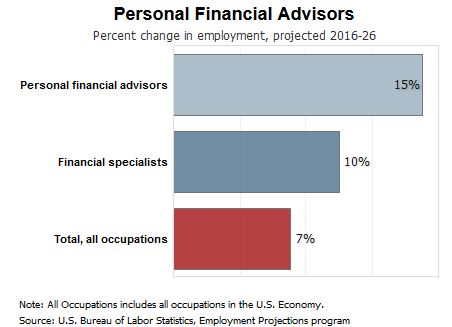Duties
Personal financial advisors typically do the following:
- Meet with clients in person to discuss their financial goals
- Explain the types of financial services they provide to potential clients
- Educate clients and answer questions about investment options and potential risks
- Recommend investments to clients or select investments on their behalf
- Help clients plan for specific circumstances, such as education expenses or retirement
- Monitor clients’ accounts and determine if changes are needed to improve financial performance or to accommodate life changes, such as getting married or having children
- Research investment opportunities
Personal financial advisors assess the financial needs of individuals and help them with decisions on investments (such as stocks and bonds), tax laws, and insurance. Advisors help clients plan for short- and long-term goals, such as meeting education expenses and saving for retirement through investments. They invest clients’ money based on the clients’ decisions. Many advisors also provide tax advice or sell insurance.
Although most planners offer advice on a wide range of topics, some specialize in areas such as retirement or risk management (evaluating how willing the investor is to take chances and adjusting investments accordingly).
Many personal financial advisors spend a lot of time marketing their services, and they meet potential clients by giving seminars or participating in business and social networking. Networking is the process of meeting and exchanging information with people, or groups of people, who have similar interests.
After financial advisors have invested funds for a client, they and the client receive regular investment reports. Advisors monitor the client’s investments and usually meet with each client at least once a year to update the client on potential investments and to adjust the financial plan based on the client’s circumstances or because investment options may have changed.
Many personal financial advisors are licensed to directly buy and sell financial products, such as stocks, bonds, annuities, and insurance. Depending on the agreement they have with their clients, personal financial advisors may have the client’s permission to make decisions about buying and selling stocks and bonds.
Private bankers or wealth managers are personal financial advisors who work for people who have a lot of money to invest. These clients are similar to institutional investors (commonly, companies or organizations), and they approach investing differently than the general public does. Private bankers manage a collection of investments, called a portfolio, for these clients by using the resources of the bank, including teams of financial analysts, accountants, and other professionals.
















